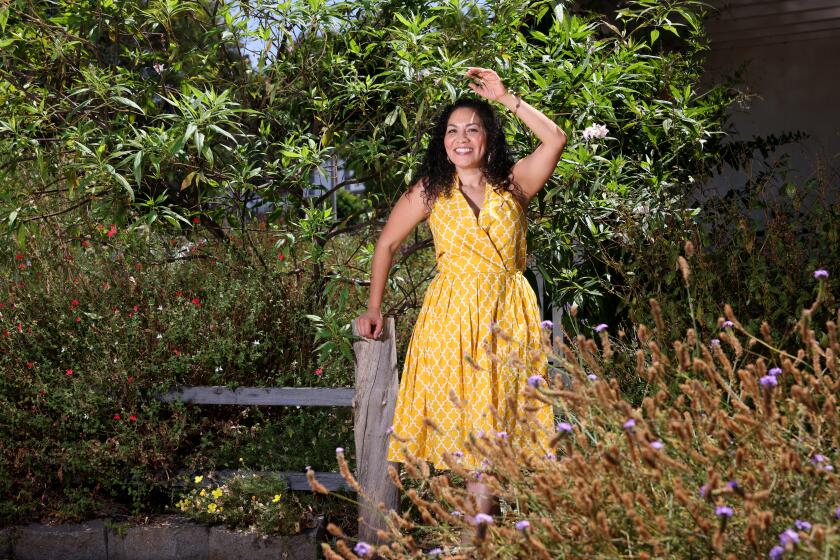In Full Bloom
A professional woman who runs a large merger and acquisition company arrives early for a flight. She stops in the airport bar for a drink.
A man approaches her. “Would you like a little company?” he asks.
“Sure,” she responds brightly. “Have you got one for sale?”
*
Judy Rosener, a beguiling 66-year-old feminist in a designer suit, delights in telling such jokes and shattering stereotypes. Whether sharing the stage with Gen. Norman Schwarzkopf and Jack Kemp or delivering a speech to female heads of state in Stockholm, she is a natural performer who can transform even the most mind-numbing event into a little ol’ chat with grandma.
She is “Maude” with a PhD, an iconoclastic management professor at the University of California at Irvine who first popped into the national conscience in 1990 with a seminal article in the Harvard Business Review, declaring that men and women are different after all. She went on to write a couple of blueprints for business including her most recent book, “America’s Competitive Secret: Utilizing Women as Management Strategy.”
She argues that women thrive in non-hierarchical ways and prefer cooperative, shared leadership; men are more inclined toward styles of “command and control.”
“Both are good,” she says. “I’m not saying women are wonderful and men are horrible. I’m saying we’ve got to utilize the skills of professional women. It’s not just a social justice issue. It’s an economic imperative.
“Women make excellent leaders. They cope well with people and diversity. They are always dealing with three kids and two cookies.”
Rosener is seated at the kitchen table of her home on Lido Island in Newport Beach. From her chair, she can look into a handsome living room or gaze out at a patio where koi splash in a pool beneath a gurgling waterfall. It is here in this paradise of tropical sounds and flowering orchids that she and husband Joe raised three children--all now successful professionals with degrees from prestigious schools.
She admits she has guilt pangs about a life that has been remarkably blessed: “I’m just a nice Jewish girl from a poor family.”
She’s also a flaming liberal with close connections to the Junior League; a hell-raising politico who defines herself as a happy homemaker; a social animal as comfortable in a five-star restaurant as hanging out with the guys at the local coffee shop; a Cadillac owner who once sported a bumper sticker that read “It’s OK to be a Democrat in Orange County”; an impeccably groomed grandmother of four who refers to herself as a dumpy old bag; and a champion of social justice who shops at Neiman Marcus, makes a killing on the lecture circuit and has been known to board her orchids.
Boards her orchids?
“Yes,” she repeats. “Board my orchids.”
Rosener comes from a highly educated family of Jewish Russian immigrants (“People who believed education is an investment not a cost”), has been married to the same man for 45 years, enjoys close relationships with children and siblings, hosts elegant sit-down dinner parties, writes memorable thank-you notes, grows roses, works out with a personal trainer, contributes generously, travels internationally and always flies first class.
“She does shout,” husband Joe deadpans.
*
At an age when most people are beginning to unwind, Rosener is revving up, relishing fame and fortune and having a hell of a good time. In recent weeks she’s spoken in Mexico, dined with world leaders in Europe, dipped into Washington for lunch with Hillary.
Which reminds her. She has got to remember to pick up her black dress at the cleaners for a trip to Boston. She’s going to meet with members of her women’s group, an august assemblage of famous actresses, CEOs, artists, politicians, fashion designers and judges.
She says she can’t mention the name of the group: “Then everyone would want to join. You have to be asked in. We’re all very visible and stuff.”
She drops several names--big names--then begs their identities not be disclosed.
By her own description, she is a highly optimistic, enthusiastic person.
“I get excited when the roses bloom,” she says. “But I know I have security most people don’t have. I can afford to be outspoken. That’s why I don’t tell women, ‘You can do it too.’ That isn’t fair. I came from an intact family. I lived in the same house growing up. Joe is an anchor.
“A lot of women don’t have that context.”
To questions about life’s inevitable difficulties and disappointments, she tries in vain to come up with something juicy. “Everyone has their ups and downs,” she says. “But we really haven’t had problems. There haven’t been any tragedies. Not even any broken bones or [traffic] tickets.”
Joe can’t think of much to add: “There’ve been a few business deals that didn’t work out. It’s been a wonderful life.”
Joe has just come home from a swim at the club. He pads into the kitchen in bare feet and shorts to make himself a mountain of a salad with a snowstorm of Parmesan, commenting about his wife as he chops vegetables.
The two met when she was a sophomore at UCLA and he was getting a master’s in business at Stanford to complement his Cal Tech engineering degree. Over the years, he founded several small high-tech companies and, at 72, divides his time between business investments and scuba diving.
The marriage has worked, he says, “because we both had our own interests. We have his, hers and ours.”
“Joe’s very secure,” Rosener notes. “He believes everyone should do what fulfills them.”
*
That simple philosophy guides much of her research, research that probably began the day she was born, Nov. 9, 1929, with twin brother Mike Bogen.
For as long as he can remember, Bogen says his sister has been a standout. In high school and college she was great at sports and president of everything. Everything.
“She was always building big friendships with professors at UCLA,” says Bogen, a retired insurance exec from Huntington Beach. “I was just trying to pass.
“She’s assertive, but she isn’t a man hater. She just wants a level playing field.”
Younger sister, Bobby Lovell, says the Bogen kids were brought up by parents who simply didn’t get hung up on obstacles. “They were of the old school. If you can’t go over it, go around it.”
Two years ago, Lovell completed a PhD in clinical psychology. She is 65.
With a mischievous smile, Rosener says she and her sister were late bloomers. The way she tells it, Rosener was “just a housewife” who raised kids and played tennis. Then one night in 1964, she met a UCI big shot at a dinner party, who encouraged her to go back to school. It just kind of happened. Serendipity.
Life is fun and interesting when you are open to change and willing to grow, she says. Too much planning is stultifying; it locks people into prisons.
Rosener insists she was never career-oriented, and just kind of landed a PhD from Claremont Graduate School when her children were grown and she was 50.
Hearing this recitation, her husband interjects affectionately: “Despite what my wife says, no one gets a PhD without career plans.”
And, of course, not every Depression-born woman had a dad with a degree from Cal Tech, a mom who was a Phi Beta Kappa from UCLA and aunts who were surgeons and psychiatrists.
“We have great family values,” she says. “But we are not religious. God hasn’t spoken to us.”
A look at Rosener’s 17-page curriculum vitae reveals much about a woman who’s always been ahead of her time and never, ever, dwelt in the wings. While other moms were schlepping kids, she was conferring with mayors and governors, fighting for low-income housing, tackling complex environmental issues and commanding a platoon of community activists with a phone in one hand, a diaper pin in the other.
In 1972, a headline in the Los Angeles Times read: “Housewife Casts Quiet, Powerful Shadow of Political Tiger.”
The untamed housewife, of course, was Judy Rosener, who was serving then on the state Coastal Commission. In 1981, then Assembly Speaker Willie Brown fired her to make room on the panel for one of his buddies.
Gil Ferguson, a longtime Rosener critic, said of her at the time, “It will probably take 20 years to eradicate much of the damage she’s done as one of the leading anti-property rights, anti-growth advocates in the state . . .
“She is a typical limousine liberal--someone who votes for public access to the coastline but lives on an island with beaches closed to the public.”
*
It’s time for a photographer to take pictures. Rosener, a frank and open person who says she grew up assuming people would like her, and “they always have,” is uncharacteristically flustered. Her face flushes. She self-consciously fidgets with the skirt of her St. John suit. She beseeches the photographer not to shoot her legs:
“I have gotten so fat! I am so unphotogenic!”
While the apology would be unthinkable from a captain of industry, it sounds perfectly normal coming from her.
In her research, Rosener studies the different styles of men and women in the workplace. She doesn’t ask to replace the male dominant culture, rather she contends that everybody is simply better off in an organization that values diversity over sameness.
Other researchers question the argument that men and women are fundamentally different.
Myra Strober, a labor economist at Stanford University, says she admires Rosener, but finds her studies lacking in substantial evidence: “I don’t think we can rely on the studies about how men and women are different. We should stress how men’s and women’s styles overlap, rather than how they are different.”
Strober’s concerned that when there’s an expectation that women are thought to be more nurturing than men, for example, they will feel pressured to succeed “in a feminine way.” Conversely, if you start telling men they don’t know how to be nurturing managers, they may feel they are excused from being just that.
“There are very few women professors at Stanford,” Strober adds. “We vary across the board. Some are sensitive and nice to students, some are snappy and unmotherly.”
While the debate on gender versus individual style continues, Rosener says there is no doubt that sex-role confusion is rampant in the workplace.
Certainly no one questions Rosener’s ability to crack open windows, and sometimes even thick corporate ceilings. Those who know her best describe her as a generous and loving person, a provocateur of ideas and a person with a highly developed moral sense.
Critics say she can be strident and opinionated.
So, despite her credentials--and frequent columns as the only female member of the Los Angeles Times’ business section’s Board of Advisors--she continues to turn down those who push her toward politics.
“I’m too controversial,” she says, “for Orange County.”
Yet few would disagree with UCI Chancellor Laurel Wilkening when she says, “Judy is a presence.”
Wilkening, one of two female chancellors in the nine-campus UC system, says Rosener is one of the highest profile faculty members at UCI: “She speaks out. She’s involved in affirmative action. She doesn’t complain. She gets in there, rolls up her sleeves and gets things done. She lives her work.”
Adds Dennis Aigner, dean of the School of Graduate Management at UCI, where Rosener teaches: “She’s challenging and pushy. She has the ability to stir things up. She is a dedicated scholar and a tremendously energetic and provocative teacher.”
*
Kim Jaussi credits Rosener with giving her the confidence to return to graduate school.
When she and Rosener met in 1990, Jaussi was selling muffins and cappuccino at the Coffee Pub in Newport Beach. Jaussi, a recent graduate of Smith College, was only too happy to talk to Rosener about subjects more stimulating than the flavor of beans.
Rosener hired her as her prime research assistant, and Jaussi is now in a PhD program at USC.
“I love her,” Jaussi says. “She’s open. She talks to everyone. She invites transvestites and transsexuals and gay people and people in wheel chairs to come talk to her students. She wants everybody’s voice to be heard.”
That’s what’s fun, Rosener says--talking to people who look and act differently from ourselves.
“In our culture, we assume it’s only the people at the top who know things,” she says. “That isn’t true. We all have something to contribute. The moral of the story is that we are all smart, only in different ways.”
She excuses herself to pick up the black dress at the cleaners.
A week later when she returns from Boston, she calls to share her adventures. Then she says, “You forgot to ask me about sex.”
“Would you like to talk about sex?” she is asked.
“Yes. I think it’s important--at any age. Very.”
(BEGIN TEXT OF INFOBOX / INFOGRAPHIC)
Judy Rosener
Age: 66.
Background: Born in Los Angeles, lives on Lido Island in Newport Beach.
Family: Married 45 years to Joe Rosener; mother of three children, Lynn, Doug and Janet; grandmother to four.
Passions: Talking, teaching, writing, politics, traveling, shopping, buying gifts, contributing to outstanding women, speaking out on social issues, growing orchids and roses, sailing, cooking, entertaining, meeting new and different people.
On helping women advance: “Women in a position to help others have a responsibility to do so. Make sure you let people know you are not an exception.”
On the battle of the sexes: “It’s not us against them. When women and men work together-- whether it’s Hillary and Bill or Liddy and Bob--two are better than one. Women aren’t better than men. They are different.”
More to Read
Sign up for our Book Club newsletter
Get the latest news, events and more from the Los Angeles Times Book Club, and help us get L.A. reading and talking.
You may occasionally receive promotional content from the Los Angeles Times.








